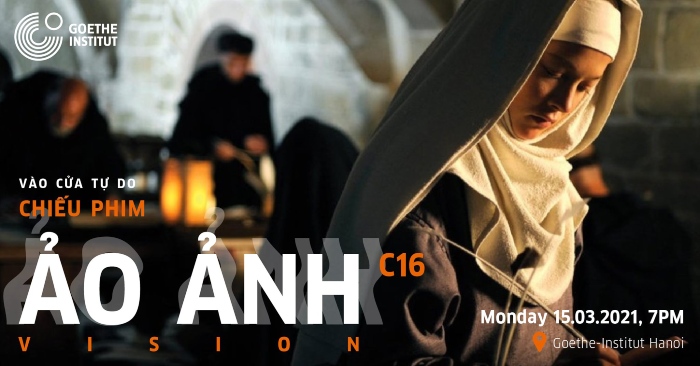Screening: Vision (PG16)

Mon 15 Mar 2020, 07 pm
Goethe Institut
56-58-60 Nguyen Thai Hoc, Ba Dinh, Hanoi
From Goethe Institut:
History film depicting the life of Hildegard von Bingen the legendary mystic who became famous as a curative practitioner as well as an early pioneer for women’s rights. Hildegard von Bingen (*1098 †1179) belonged to the Christian order of the Benedictines. She was abbess, poet, composer and an important universal scholar. In the Roman Catholic Church she is still worshiped as a saint and teacher. She has also been commemorated in the Anglican, Old Catholic and Evangelical churches with memorial days. Hildegard von Bingen is considered the first representative of medieval German mysticism. Her works deal with, among other things, religion, medicine, music, ethics and cosmology. She was also an advisor to many personalities. An extensive correspondence has survived from her, which also contains clear admonitions to high-ranking contemporaries, as well as reports on long pastoral trips and her public ministry.
About the film
At the age of eight, Hildegard was handed over by her parents to Disibodenberg Monastery. There she is brought up and instructed in medicine and herbal medicine. As her teacher dies, she teaches the new nuns in theology, medicine and botany. One day she confesses to the monk Volmar that she is experiencing religious visions; the latter immediately reports to the abbot, who finally informs the bishop of Mainz. A commission should then check the correctness of the visions, but refuses. Only the Pope personally can judge it. Hildegard then turns directly to Bernhard von Clairvauxthe most respected theologian of his time. He is pleased with her visions and receives confirmation from the Pope; From now on Hildegard can write down and publish her visions.
Language: German with english and vietnamese subtitle
Price: Free entry, no registration required
Margarethe von Trotta, Director
After completing drama school and engagements on the various German theatre stages, Margarethe von Trotta was seen in many roles in New German Film from 1967, including films by Rainer Werner Fassbinder, Herbert Achternbusch and Volker Schlöndorff, with whom she also wrote and directed several films. Her first independent work as film director was “The Second Awakening of Christa Klages” (1978). This was followed by controversial films such as “The Bleierne Zeit” (1981), “Rosa Luxemburg” (1986), “The Promise” (1995). Again and again in her films it is about reflecting on the past, individual as well as political and social, and attempting to critically examine it.
Barbara Sukowa, main actress
Like many stars born in the post-war period, Barbara Sukowa (*1950 in Bremen), celebrated her breakthrough with director Rainer Werner Fassbinder. As the muse of the filmmaker Margarethe von Trotta, she embodied the RAF terrorist Gudrun Ensslin in Die bleierne Zeit (1981), the German-Polish socialist of the same name in Rosa Luxemburg (1986), the philosophical theorist Hannah Arendt (2012) and in Vision – From The Life of Hildegard von Bingen (2009) even a saint. – But the triple mother and wife of multimedia artist Robert Longo had a second career in New York. As a singer in classical concerts as well as with her own rock band and flying visits to cool films like John Turturros Romance & Cigarette (2005), she says she finally learned “the smile” in the USA.
Follow updates on event’s page.
 | Goethe-Institut Hanoi 56-58-60 Nguyen Thai Hoc, Ba Dinh, Hanoi Tel.: +84 24 3734 2251 Fax: +84 24 3734 2254 [email protected] website |














